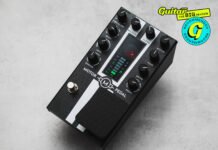
Meet the guitarists calling for meaningful change to the way the music industry treats women
The global music industry is finally facing up to truths that women have known implicitly for decades: that the harassment, abuse and exploitation of women by men within the industry is endemic.
READ MORE: “Women are putting out some badass guitars”: Nita Strauss talks signatures, solo albums and career-shaking shifts
More than (67 per cent) of women responding to an American Music Industry Research Association survey had been sexually harassed, nearly half of UK women musicians have been sexually harassed at work, and almost half (45 per cent) of New Zealand women admit they don’t feel safe in places where music is worked on or performed.
Most recently, an Australian independent report “Raising Their Voices” surveyed more than 1,600 respondents, all of whom worked in the music industry. It revealed that 82 per cent of victims of sexual harm or harassment did not report it. More than half of those who did report it felt that their experience was dismissed or otherwise poorly dealt with, thus enabling abusers to continue their careers without consequence.
Almost 75 per cent of women respondents to the survey had been harassed, and more than 90 per cent reported negative discrimination from those in leadership positions, such as management and supervisors.
Image: Press
The gatekeepers
In an opinion piece for The Guardian earlier this year, film-maker Tamanna Rahman – whose investigation Music’s Dirty Secrets: Women Fight Back screened on the BBC in Northern Ireland – asked, years after Hollywood had its own reckoning with the predatory behaviour of men in positions of power, “Why did #MeToo bypass the music industry?” The answer was simple: “Just look at the gatekeepers”..
In 2017, the BBC revealed that sexual abuse and exploitation of women and minors was “endemic”. Yet few heads have rolled. There is a culture, much as there was in pre-Weinstein Hollywood, of men excusing their abuse, assault and exploitation of women as part of the hedonistic industry lifestyle.
But knowing is one thing. Making meaningful changes is another. “We are sorry… change is going to come” promised Australia’s peak music organisation APRA AMCOS in response to Raising Their Voices.
Female music industry workers would be entirely justified in responding, “Why hasn’t it already happened?” Sorry means nothing without measurable, imminent action.
Where women are in positions of leadership, and where women have a voice, there is enhanced security for other women.
They are also in a position to lift other women – in terms of their pay and in regards to their representation in media, awards and performance opportunities.
Australian women still earn less than men in the music industry, they’re underrepresented in radio playlists, festival lineups, in awards and judging panels, and on major industry boards according to research released in August by the University of Sydney’s Women, Work and Leadership Research Group (in a report called “Skipping A Beat”).
The Australian Record Industry Association (ARIA) only finally recognised women in their (still) male-dominated boards and workplace in 2018. Women are still disproportionately disadvantaged in technical and backstage roles, too. The report advised that women need to be visible and represented on boards, in leadership and that public funding ought to be decided upon gender criteria.
Reluctant activists
Australian singer, songwriter and guitarist Jaguar Jonze (Deena Lynch) admits she never intended, nor wanted, to become an activist, but her experiences of abuse within the music industry had plunged her into the role. She recently presented a speech at Australian industry event BIGSOUND, regarding her own experience and her desire for her story, and the common stories of Raising Their Voices, to be a catalyst for change.
“It has taken a lot of sacrifice and energy from survivors to establish awareness, but it can’t stop there,” Lynch explains. “Awareness is just a first step, there is much more work to be done to address specific issues, bring about a cultural shift and begin to reform. We now require commitment to change and action. I hope that with the Music Industry Review report, the industry leaders will commit and implement the recommendations to begin the process of creating safe arts workplaces.”
Dorothy Carvello, the first female A&R executive at Atlantic (and author of Anything For A Hit), founded Face The Music Now, an organisation that enables women to share their experiences in a safe space, and to find legal counsel for advice. One of their major intentions, and campaigns, is to end the non-disclosure agreements that gag women from speaking publicly about abuse, harassment and any settlement arrangements.
Image: Press
On the ground
But what is the reality for those working in the industry today? The easiest way to find out is to ask them. Izy Hewitt is the guitarist and vocalist of Baby Mullet, a Melbourne punk-rock trio completed by Kate Dougherty (bass, vocals) and Mack Ellis (drums), and it doesn’t take much probing for her to share her experience of microagressions and casual sexism playing in a band in 2022.
“Often at shows other bands will ignore me and Kate and only speak to Mack,” Hewitt says of the gender-disparities backstage. “Sound engineers don’t believe we can lift our gear, or they’ll explain how to use our own gear, but they don’t do the same to Mack. Or we get the classic: ‘You guys are really good for a girl band’.”
Hewitt says it’s common for men in the audience to approach her and Dougherty after performances, making physical and verbal suggestions and provocations that she’s certain men don’t have to tolerate.
So how could things get meaningfully better for women in the industry? Would having more women in backstage crews, still a hugely male-dominated industry, help?
“I think it would, absolutely,” she accords. “When I was younger, I went to Girls Rock! Melbourne which was female and non-binary, all about women gaining confidence to take up space and play music. There were talks from Courtney Barnett and all these well-known women in music sharing how to speak up and build confidence. That creates a community.”
Girls Rock! was founded in 2001 as a day-camp based in Portland in the US, before establishing into a network, the Girls Rock Camp Alliance, which has camps all over the world now. The Melbourne arm was founded in 2015 and now operates as Amplified Victoria.
Hewitt says that the reports of abuse and harassment highlighted in the Raising Their Voices report echoed her own backstage experiences.
“When you’re in a smaller band and you experience harassment or abuse at work, unless you’ve got a manager, you’re left to your own devices. That can be so daunting, because if something happens, I’ve got no management, and I don’t want to share it on social media.”
In Hewitt’s case, she was able to report it to the venue and tell her bandmates. It gave her some solace knowing that she was supported psychologically, but whether the male perpetrator even understood the damage he’d done and was dissuaded from doing it again we can’t know.
Venue managers and band bookers have the power to create safer spaces, Hewitt believes. And she ought to know, as a bartender in one of Melbourne’s prime music venues.
“I’ve had some very uncomfortable experiences with people in bands. I’m a bartender at a music venue in Melbourne and even in that job, I have to watch these people play. I have seen bands that are known for sexual harassment and abuse applying to work in my workplace.”
There should be clear rules laid out before bands are booked that educate them on how to play gigs in a respectful way, she says.
“Bookers should be more informative and make it clear that venues will not tolerate any type of harassment, abuse or discrimination, with the consequence of getting kicked out if those rules are breached.”
Image: Press
…for a girl
Anna Lienhop is the singer and guitarist of Melbourne post-punk-grunge trio Moody Beaches and was involved with Girls Rock! Melbourne as a mentor. She has worked in venues, like Hewitt, and can attest to the disparaging attitude of some men – backstage and in the audience – toward women in rock.
“I was playing music as a teenager and in my early twenties, when being a non-dude was still a novelty,” says Lienhop, whose formative musical influences spanned Veruca Salt, L7, Bikini Kill and Babes in Toyland.
“As far as music venues go, a lot are proactive in trying to create safe spaces for patrons and artists. In terms of quotas and safety of staff, it’s slow progress. It’s such a casualised workforce that the high staff turnover means that knowledge doesn’t stay in the sector.”
Even though there is a high staff turnover, Lienhop suggests that greater equality and female representation back and front of stage can be reached through formal agreements.
“Representation quotas could be written into venue agreements with artists. Some booking agents will look at [a band’s] application to play at a venue, and if they value community, inclusiveness and representation, they’ll opt for artists accordingly.”
Lienhop has refused to play shows, for reasons from representation of gender to a misalignment in political beliefs. She recognises that this is a benefit of having a day job that means music isn’t her bread-and-butter.
“Working on the door at a music venue and as an artist, I’ve chosen from experience to be selective about venues. I’m lucky enough that managers and co-workers have supported me. If someone is making comments about my body or being abusive, I’ve felt able to go to a manager or security and ensure that I feel safe.”
It is a safety many women don’t feel, though, as was evident in the Raising Their Voices report and in Jaguar Jonze’s speech at BIGSOUND. “I can’t and won’t be complicit in the system that broke me and hurt me,” she told the assembled audience. As an artist, and an activist, she said, “I have power, I have a voice, I’ve found purpose.”
When she released Who Died and Made You King? it was a not-so-subtle stab at former, long-time Sony Chief Executive Denis Handlin who was the subject of an Australian investigate report on ABC’s Four Corners last year.
Jonze’s bravery and honesty has enabled women musicians to admit their own stories publicly and anonymously. It’s not the first time, and it likely won’t be the last time we lament men’s abuse of their power and dominance in the music industry.
Both Hewitt and Lienhop asserted that women have to have each other’s backs. Men – who vastly outnumber women in this industry – have to have our backs too, though. We are each part of the change, as professionals within the industry and/or as music lovers.
If the themes and experiences shared in this article have impacted you or someone you know, contact details for national mental health helplines from various countries can be found at the link.
The post Meet the guitarists calling for meaningful change to the way the music industry treats women appeared first on Guitar.com | All Things Guitar.
Source: www.guitar-bass.net












